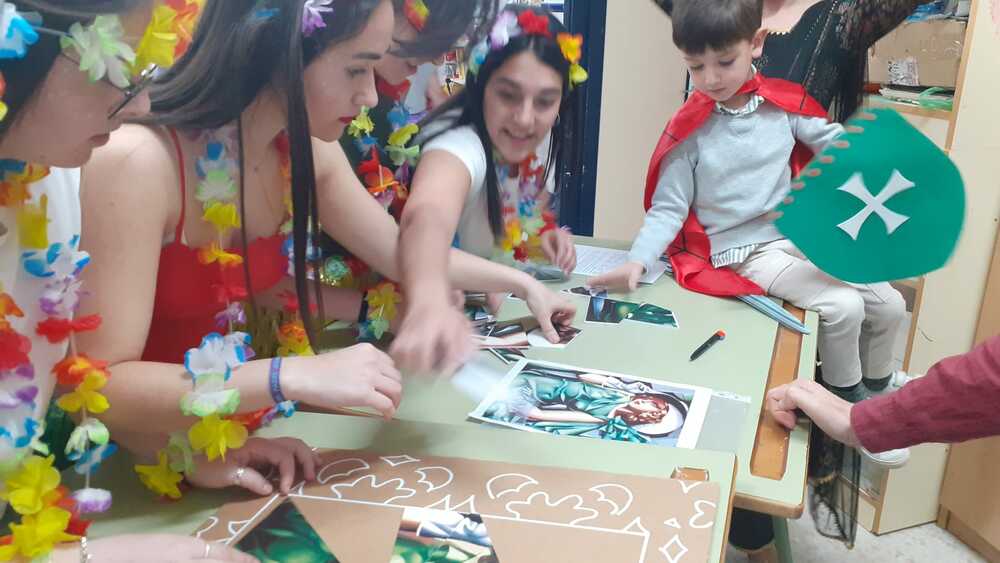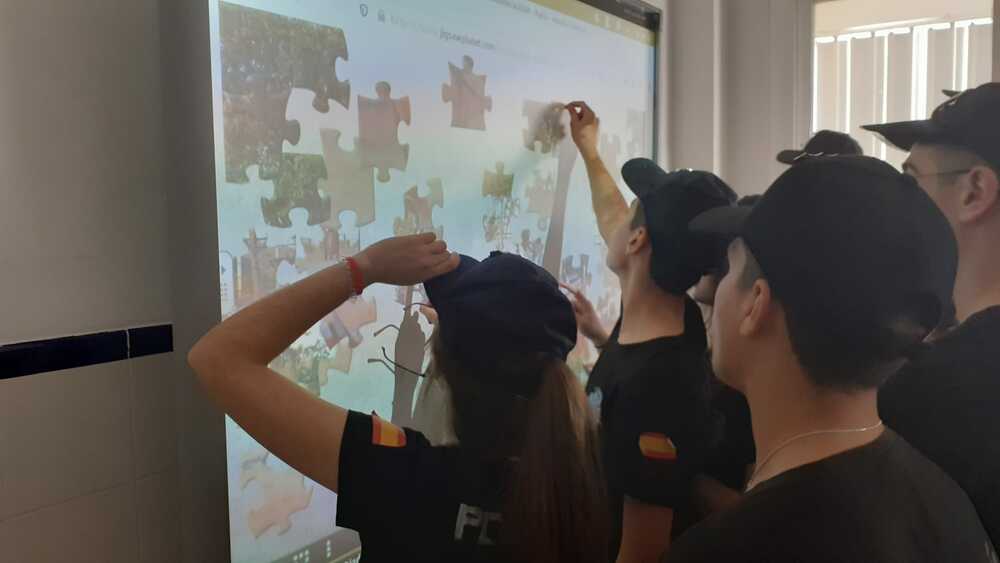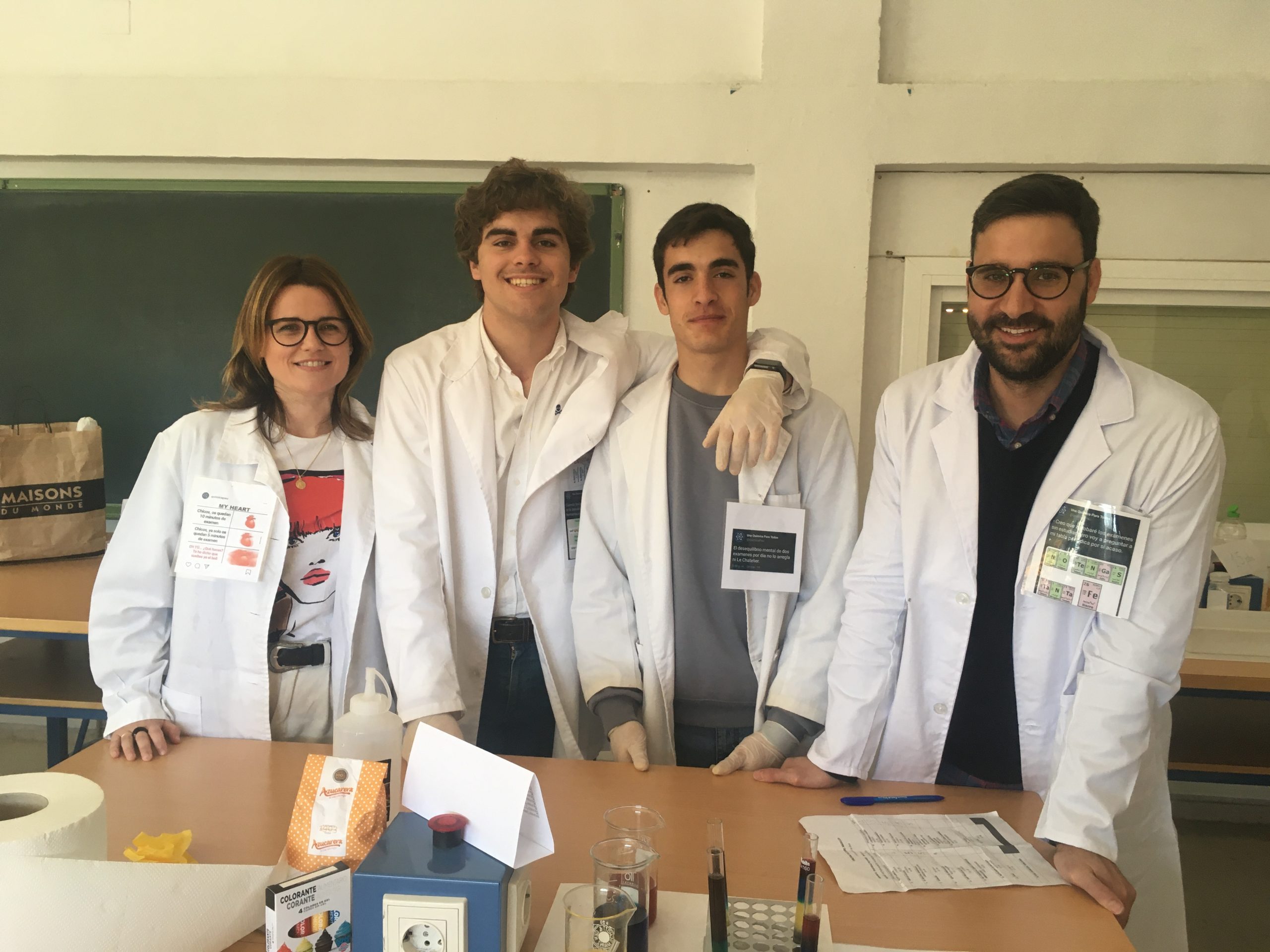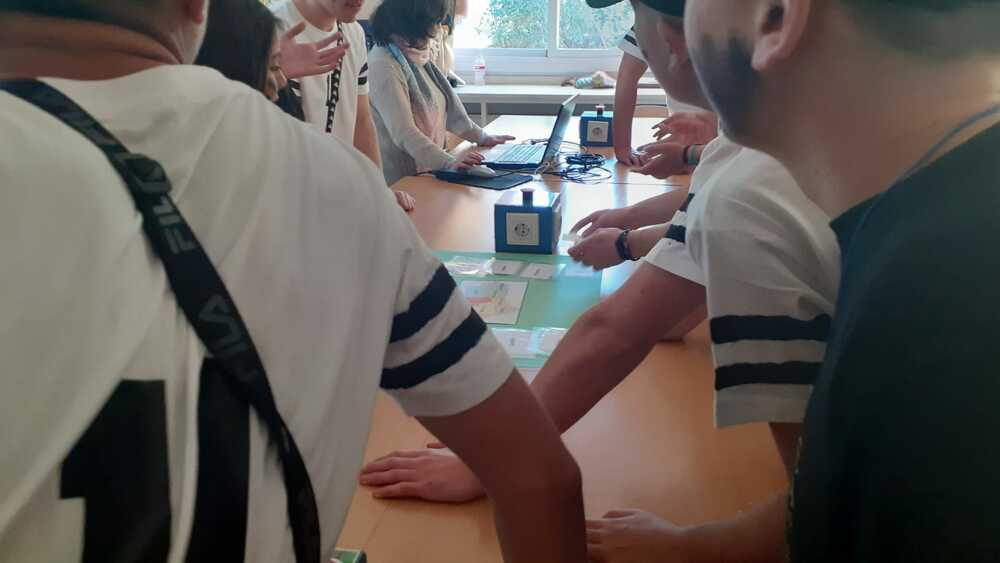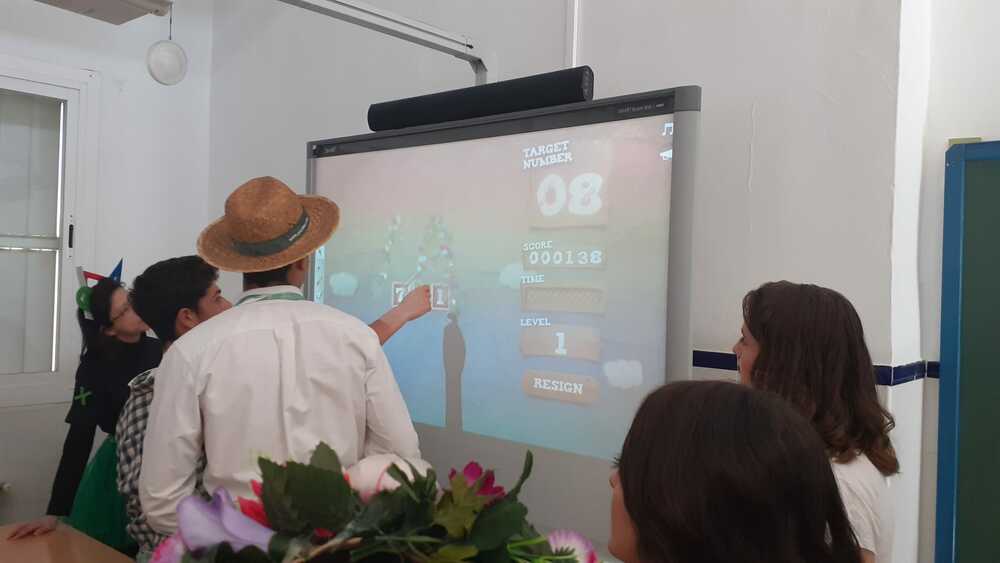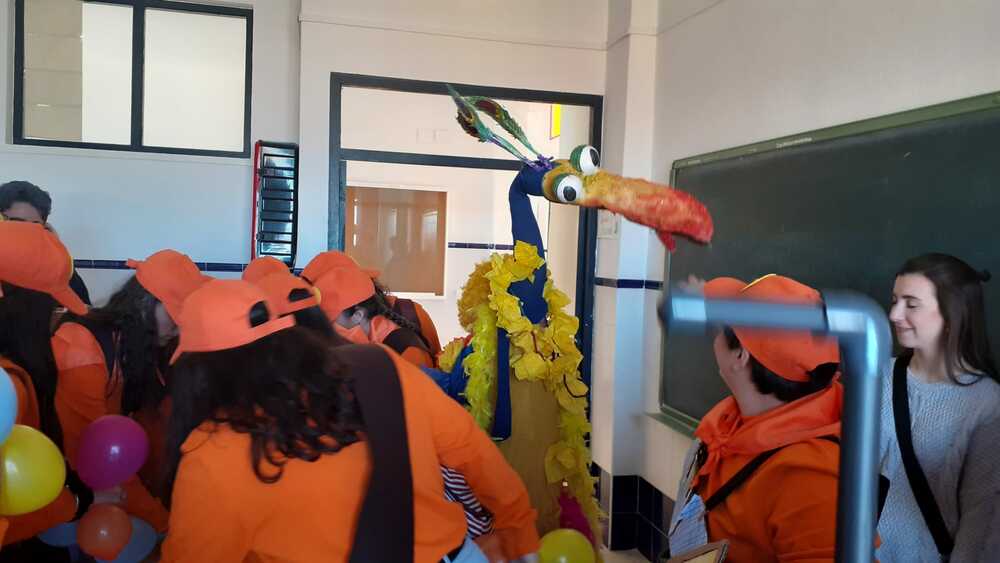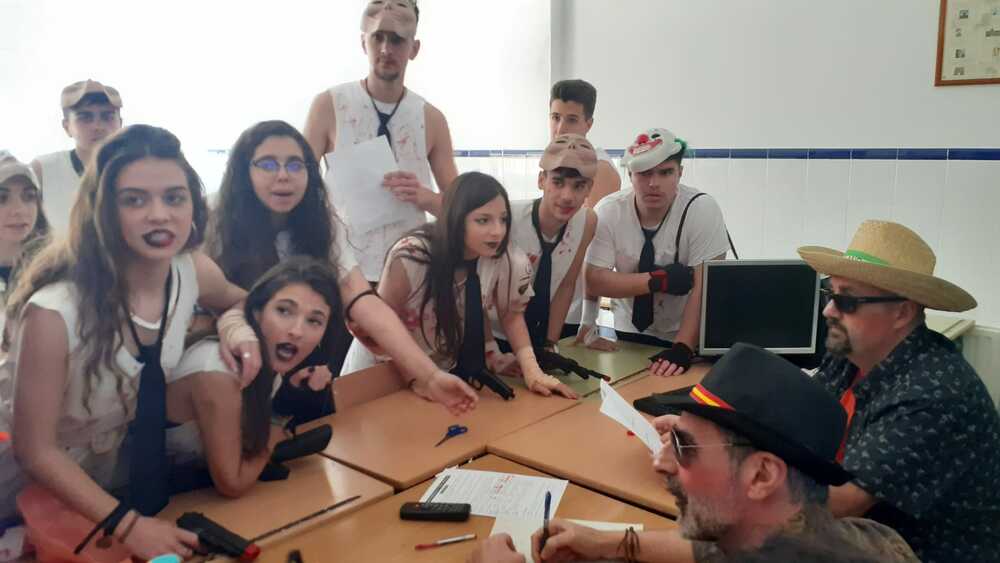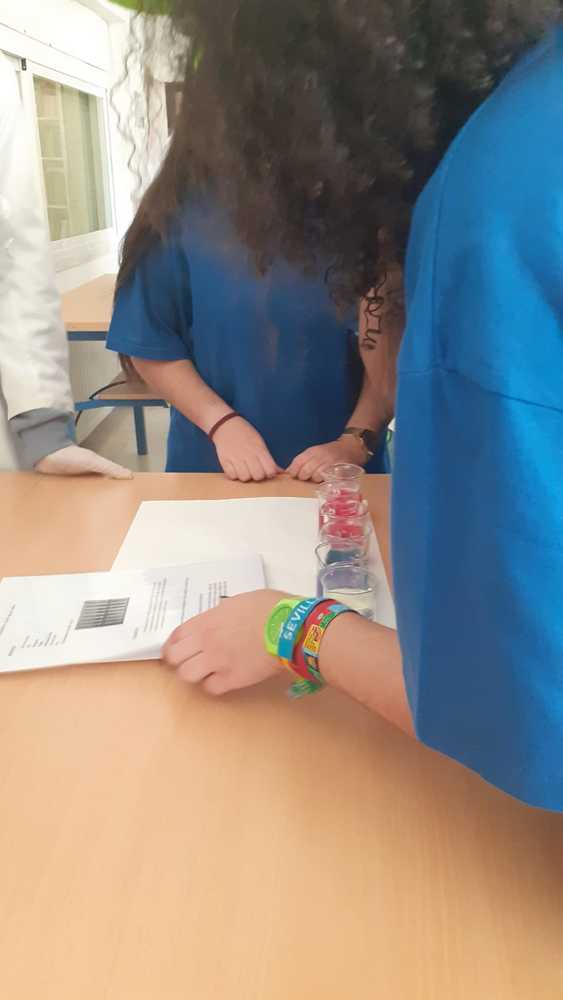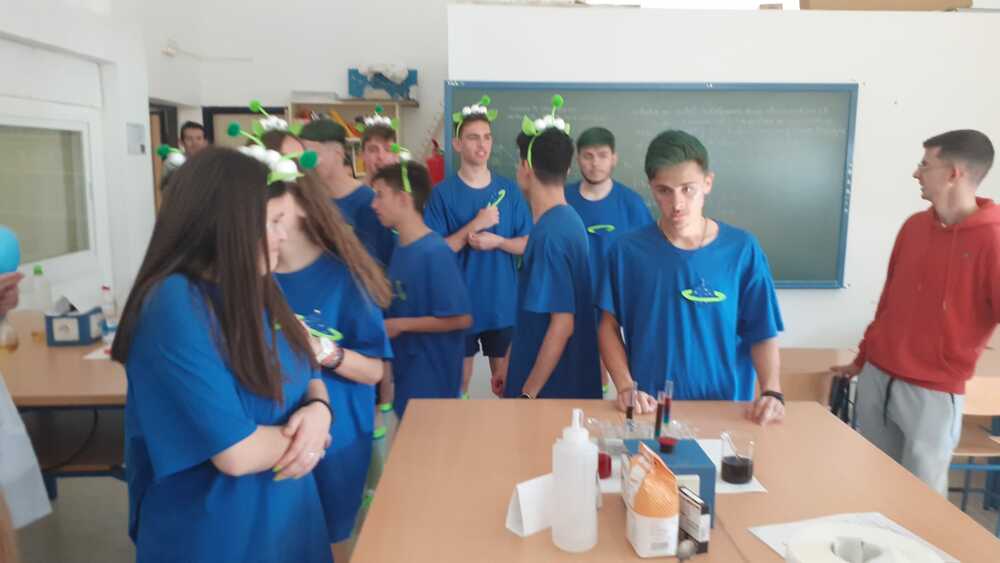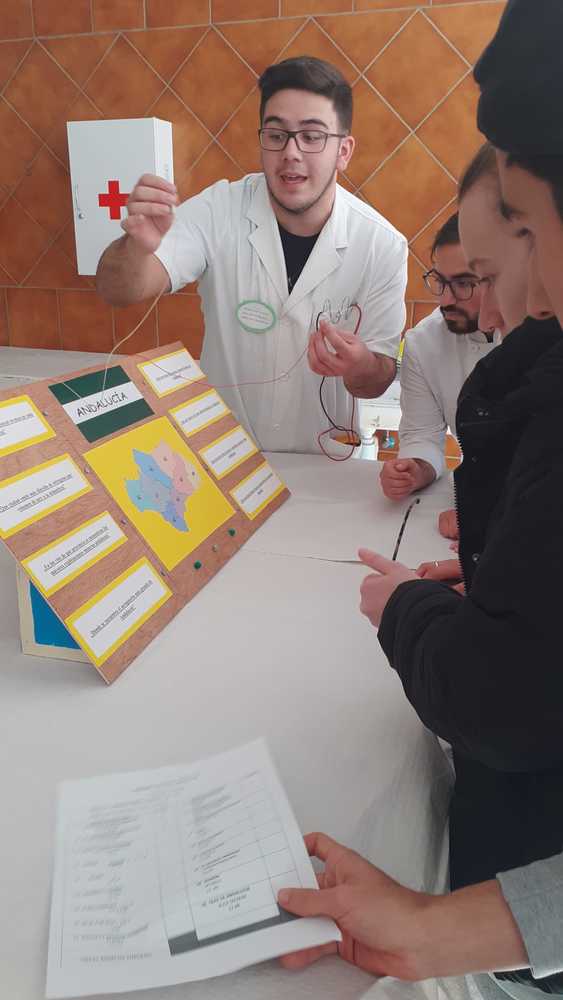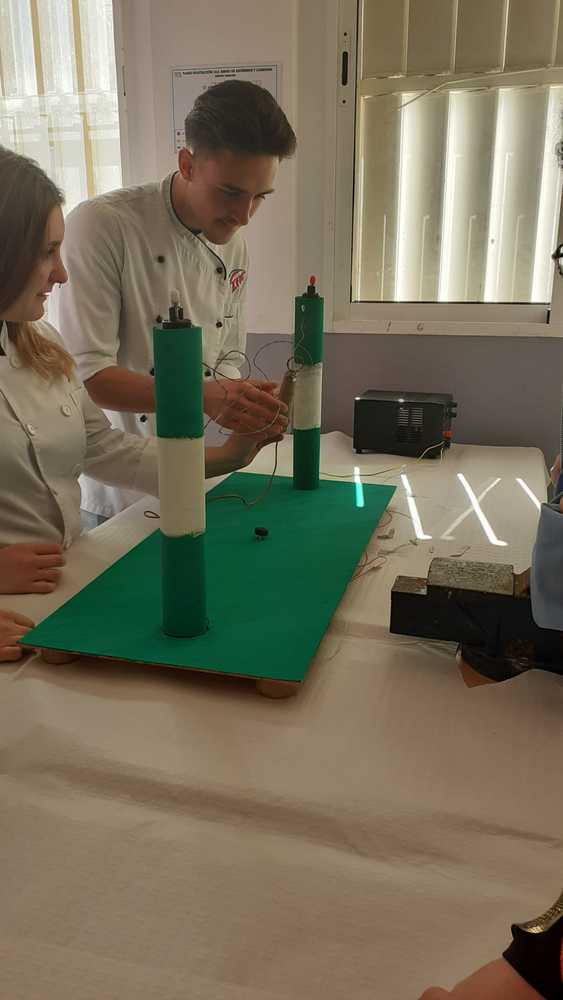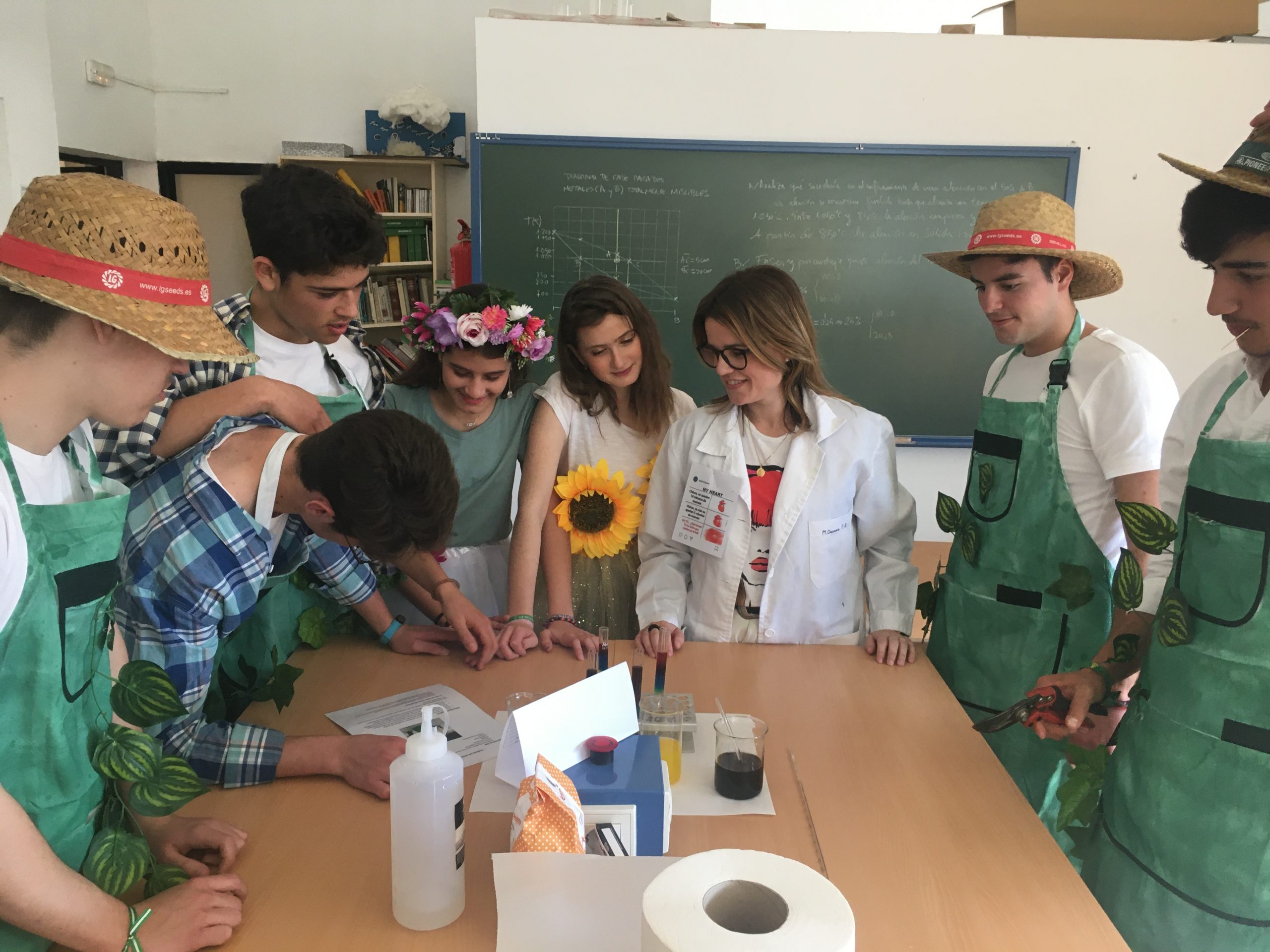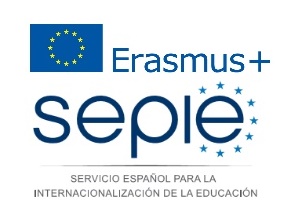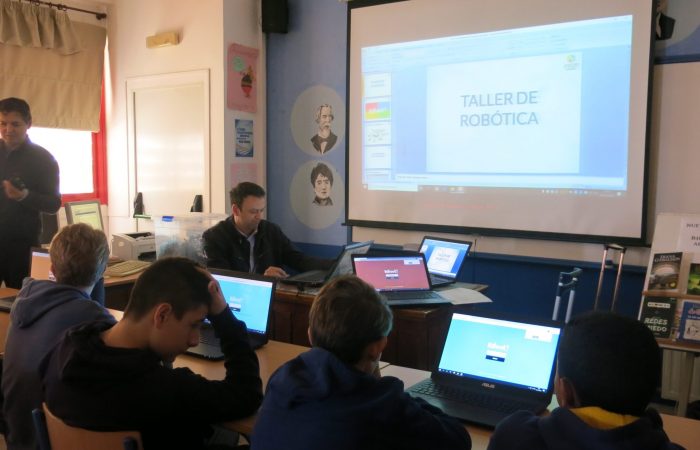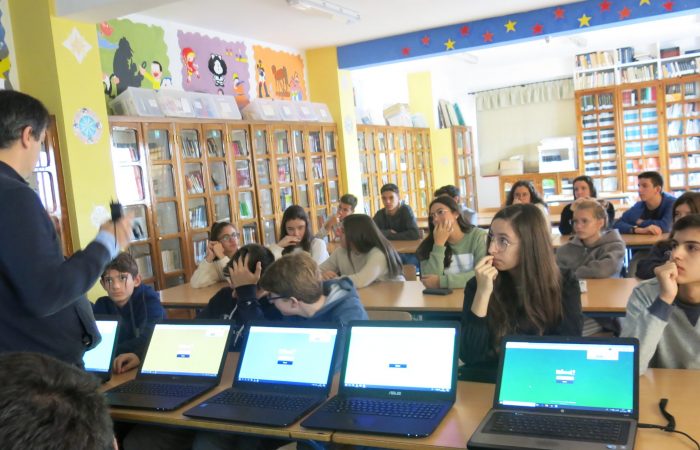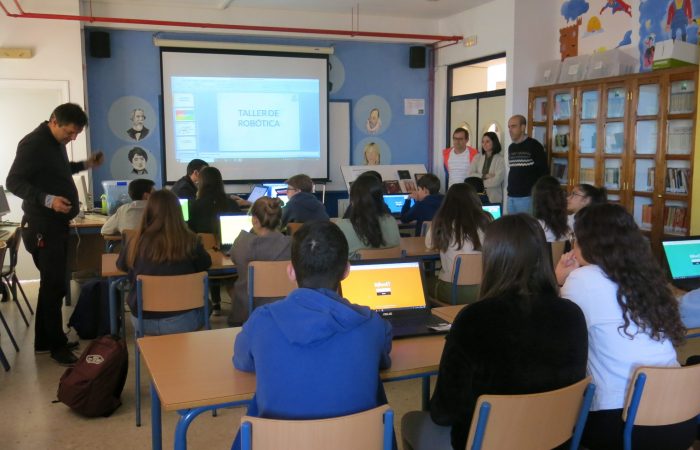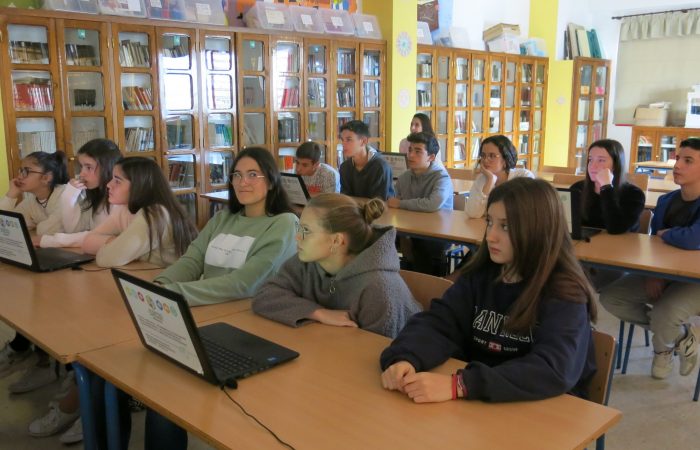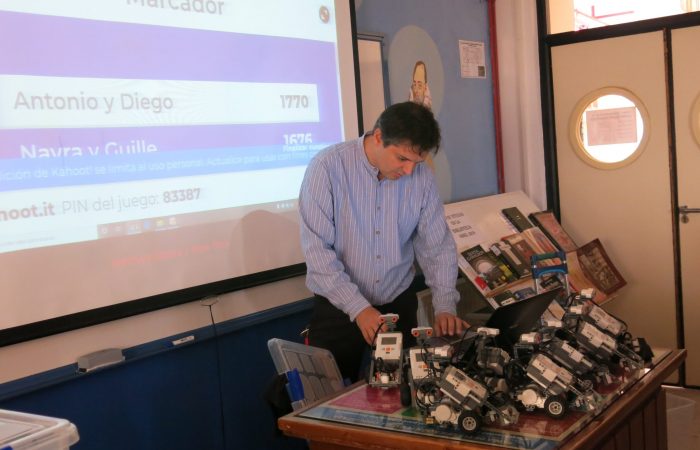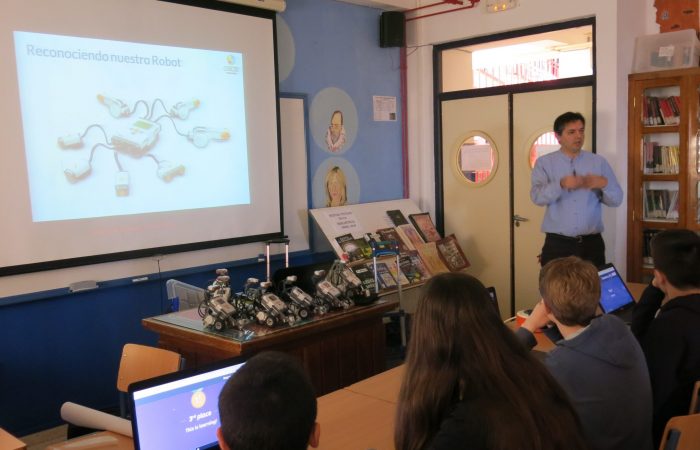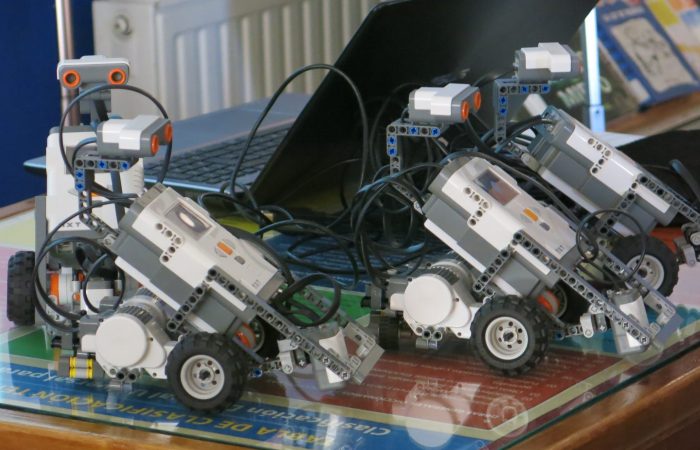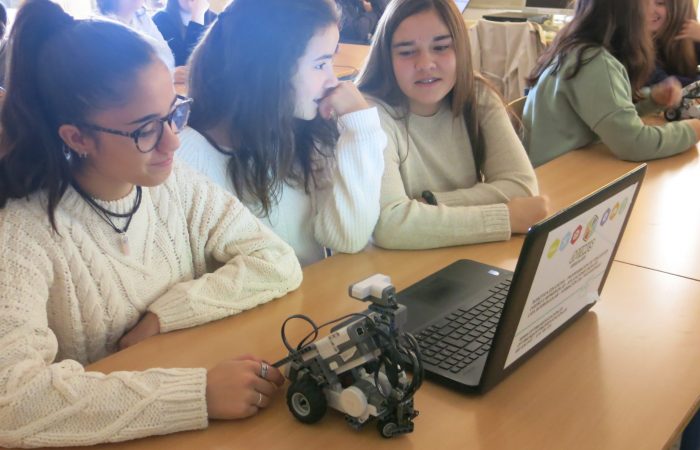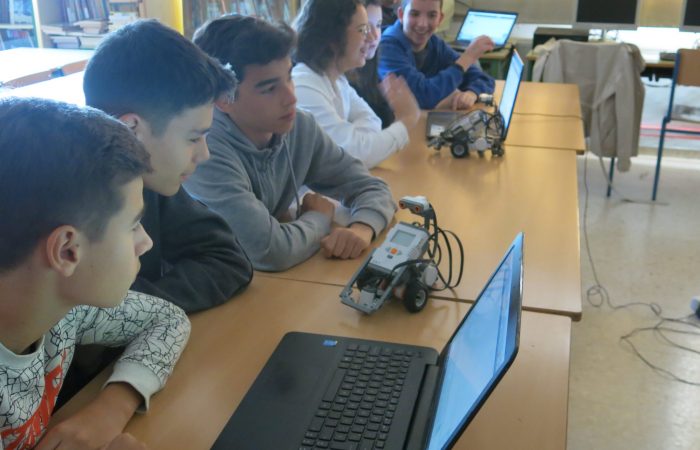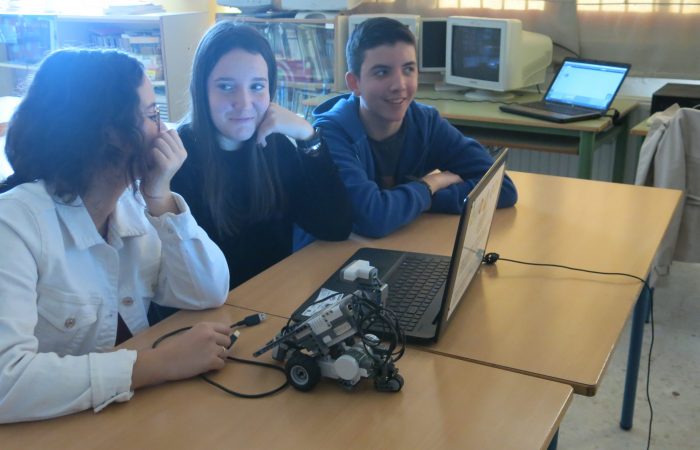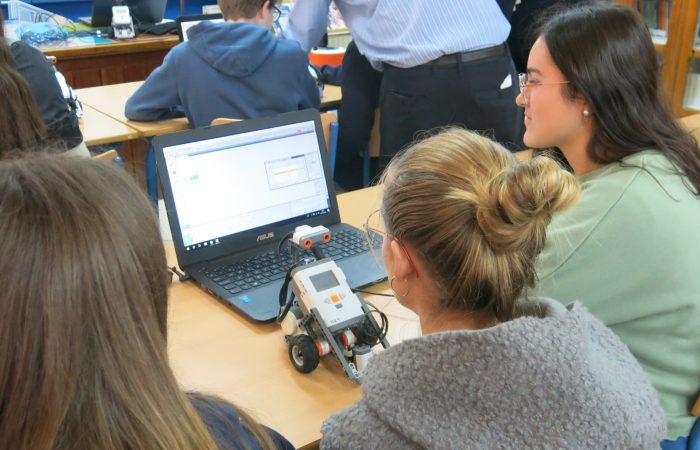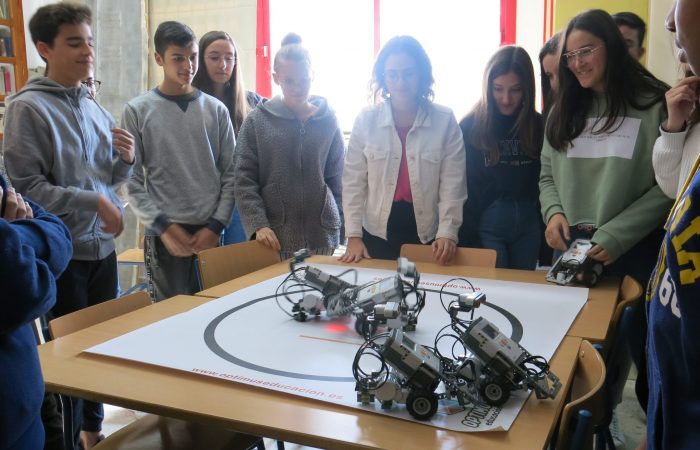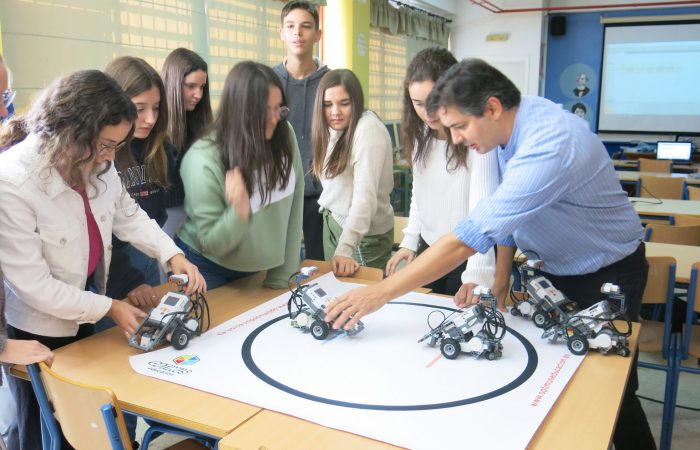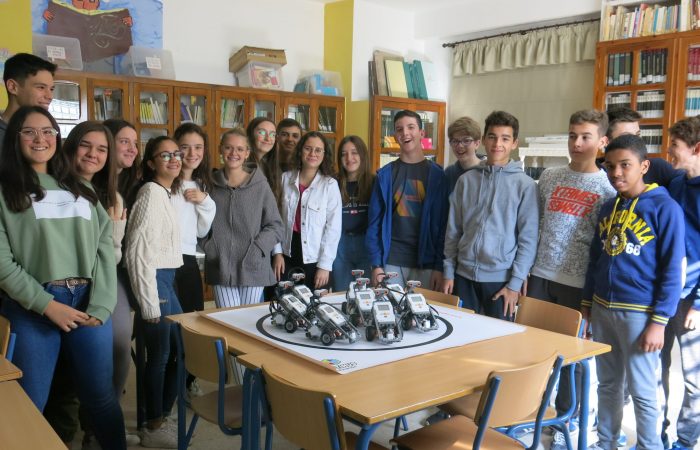
Hoy en día la tecnología y el rápido desarrollo de las ciencias, ingeniería y las matemáticas está cambiando nuestra sociedad a pasos agigantados. Sin embargo, la escasez de personal con habilidades STEM (Science (ciencias), Technology (tecnología), Engineering (ingeniería), y Mathematics (matemáticas), junto con la escasa presencia de la mujer en estos campos nos ha motivado a trabajar en este proyecto Full Steam Ahead!.
Este proyecto Erasmus está dirigido a alumnos y profesores de 6 países diferentes (Eslovaquia, Polonia, Estonia, Grecia, Finlandia y España), y sus principales objetivos son incentivar la educación STEAM (que integra las STEM y el Arte) entre los alumnos, sobre todo de las alumnas, por un lado, y tratar de combatir la desigualdad de género en el mundo de las STEAM, por otro.
El proyecto tendrá una duración de dos años durante los cuales se realizarán 6 eventos de enseñanza-aprendizaje, uno en cada país participante. El 1º de ellos está dirigido sólo al profesorado, y tendrá lugar del 15 al 19 de diciembre en Marchena. Para esas fechas esperamos en nuestro centro escolar la visita de 15 profesores extranjeros, los cuales recibirán aquí formación en la metodología STEAM, a través de unos talleres, por un lado, y tendrán la oportunidad de conocer nuestra cultura, monumentos y gastronomía, por otro.
Los demás cursos de formación que tendrán lugar a lo largo de estos dos años estarán dirigidos tanto al profesorado como al alumnado. Se celebrarán, por este orden, en Finlandia, Eslovaquia, Estonia, Grecia y Polonia.
FINLAND: Del 6 al 12 de febrero, 2020
ESLOVAQUIA: Del 27 de marzo al 2 de abril, 2020
ESTONIA: Del 4 al 10 de Octubre, 2020
GREECE: Del 10 al 16 de enero, 2021
POLAND: Del 18 al 24 de April, 2021
En nuestro caso, vamos a trabajar este proyecto con nuestro alumnado de 3º ESO, y están involucrados profesores de los departamentos de Física y Química, Tecnología, Informática, Matemáticas, Dibujo e inglés.
Desde la Dirección del Centro y del conjunto del profesorado se apoya este tipo de proyectos, ya que supone un desafío en la mejora de la calidad de enseñanza y una oportunidad única para algunos de nuestros alumnos que, por sus circunstancias personales, no tienen la posibilidad de viajar al extranjero o a conocer personas de otras culturas tan diversas como en este caso.
Taller de robótica
El pasado viernes 8 de noviembre, día de las STEM, se impartió en nuestro centro un taller de robótica dentro del Proyecto Erasmus+ Full Steam Ahead!, dirigido al alumnado de 3º de ESO, e impartido por un profesional de la empresa Optimus, especializada en impartir talleres, tanto al alumnado como al profesorado, relacionados con las disciplinas STEM.
Con este taller se pretendía, a través del aprendizaje de la robótica, y en un ambiente lúdico, distendido y divertido, despertar entre el alumnado, por un lado, la necesidad de prepararse para un futuro cada vez más tecnificado, y , por otro, el gusto por el conocimiento, la creatividad, el trabajo en equipo, el análisis y la resolución de problemas.
Otros objetivos más concretos fueron
– Describir qué es un robot, qué papel tienen en nuestra sociedad y en el entorno educativo.
– Reconocer los componentes básicos de un robot y su funcionamiento.
– Fomentar el desarrollo de habilidades incluidas como: ciencia, tecnología y matemáticas.
A este taller asistieron 19 alumnos de 3º ESO, interesados en participar en este proyecto Erasmus, y varios profesores de varios departamentos relacionados con las STEM.
He aquí algunas de las opiniones de los asistentes:
“Al no haber realizado una tarea como esta anteriormente, el taller me sorprendió un poco, me pareció bastante interesante y también divertido, ya que pude compartir esa experiencia con compañeros de otras clases. Una de las cosas que hicimos fue jugar a un test de robótica y a partir de ahí organizamos en grupos una serie de pasos que tenía que realizar el robot. El de mi grupo se llamaba ElMaGe, parecía pequeño, pero eso no quitaba todas las cosas que podía hacer.
Lo más gracioso fue cuando hicimos una batalla en un círculo de papel. Consistía en poner dos de los robots dentro de la línea negra y el que se caía o salía fuera era el que perdía.
Yo creo q todos se lo pasaron igual de bien que yo.”
Gema Navarrete Zampalo 3º ESO B
“Hi! I’m Elena Guisado, of 3rd year B. I’d like to tell you in detail how the Erasmus+ project I’m trying to be in is. To start with, I think it’s a project not everybody has access to or not everybody is interested in, but for me it’s one of the most important opportunities nowadays.
The project is based on 5 travels around Europe, in particular these five countries: Estonia, Slovakia, Poland, Finland, Greece and our country, Spain. Its purpose is to make female teenagers being interested in science in general, because in this type of degrees there aren’t many women interested in it.
The name of the project is S.T.E.A.M, and the meaning of this acronym is “Science, Technology, Engineering, Art and Mathematics”, five basic fields which are important for women’s rights and their lives. Because of all these reasons, European Union countries want to increase the number of female students registered in these subjects.
About the project, on Friday 8th November our teachers organized a robotic workshop in which a man taught my classmates and me how we had to adjust a robot with a computer system to make him move. It was so exciting! I’ve never tried to do a similar activity before and when I went out of the classroom, I was amazed, I couldn’t believe the things I had learnt minutes ago.
In conclusion, this talk made me open my eyes to the incredible science world. I will never forget this experience with all my friends!”
Elena Guisado Talaverón 3º ESO-B
“For two years, we, the students of third level ESO, are going to take part in an Erasmus project, whose main topic is the development of women in the science area.
We take part in this project together with other countries like: Poland, Estonia, Slovakia, Greece and Finland. The purpose of this project is that the students who are participating can learn about how the technology is revolutionizing the science world.
Last Friday 8th November we were lucky to participate in a robotic workshop, in which some professionals in this subject came to our high school to introduce ourselves into the world of robots and how important the robots are when we are going to do a work.
This activity consisted of dividing the students into some teams of three people and each group had got a computer and a little robot. This robot has got some parts like: two wheels connected to a CPU, a light of infrared rays and a wave emitter. The connection between both elements is possible thanks to a cable USB.
The professional teacher taught us how to program a robot through a computer programme.
During the whole workshop we were programming a robot to make it go on, go back, turn right, turn left, turn around, stop… and at the end we started a fight between the robots, “it was an unexpected ending” where we laughed a lot.
In my opinion, this experience was very exciting, funny and interesting because I had the opportunity to be in touch with the main thing of this future society: a robot.
I would like to do this activity again.”
Julián Baco Sánchez 3º ESO-A
“On Friday 8th November we did a robotics workshop. The truth is that with that experience we learnt a lot of things.
This workshop consisted of knowing the parts of a robot, and, on the other hand, to learn how to give instructions to the robot through the computer.
First, we started to play an online game, to get an idea of what parts the robots have and how they work. Then we took the robots and connected them to the computer through an USB wire and we started giving the robots instructions to move. Finally, we made a fight with the robots. It was a lot of fun!”
Aly El Bachir Yara 3º ESO-A
“Last Friday, November 8th, International Steam Day was celebrated. To celebrate it, the students that belong to the Erasmus + Program attended a Robotics Workshop.
When they told us that this activity was going to take place, I really thought it would be another boring talk, but it was the opposite.
21 students from 3rd ESO went to the Library. There, we worked in groups of 3 and they distributed a computer to each group.
The Workshop was divided into 2 parts:
The first part consisted of a Kahoot in groups, about Robotics, in which we began to have some ideas on the subject.
In the second part, we worked with the same groups, and they distributed a robot to each group. Surprisingly, we ourselves were able to programme some movements for the robot on the computer, something that I would never have imagined.
All this made that I do not see Robotics like something unattainable.
If we add to all this the laughs, it was a pleasant and productive workshop.”
Alfonso Ortiz Galindo 3º ESO-C
“Next, I’m going to give my opinion about the robotic workshop like teacher of the Project. The objectives of Full Steam Ahead! are those that all teacher of science hope their students reach. With this workshop the Math teacher could answer the typical question of students “Teacher and what’s that for?”
The robotic workshop was very well structured. It began with a kahoot questionnaire to introduce to students in the world of the robotics, continued with the instructions to programme the robots to closer the importance of the Science and the utility of the robots in the daily life to the students and finished with the fight the programmed robots to show the students the most playful side of the Science.
I could see how the students and the teachers got hooked on the activity and enjoyed of the Science from another point of view out of their typical math, technology, computer,… classes. The final of robotic workshop was an unexpected final because nobody in the room could image that our robots were going to fight in the sumo wrestling match and that the victory depended of our programming.”
Mª Jesús Moreno Iraberte, Maths teacher
Galería
Concurso de Logos
Todo proyecto Erasmus+ necesita un logo que represente al proyecto y a los países participantes. Para elegir el logo de nuestro proyecto Full Steam Ahead! se han llevado a cabo dos fases:
– Fase 1 a nivel nacional, es decir, cada escuela participante selecciona el logo de entre los presentados por su alumnado.
– Fase 2 a nivel internacional, es decir, se elige el logo de entre los presentados por las seis escuelas.
El pasado 8 de noviembre los 20 alumnos inscritos en este proyecto hicieron entrega de sus logos. Hay que mencionar el alto nivel de los trabajos presentados, por lo que ha resultado bastante difícil decantarse por uno.
El tribunal ha estado formado por 19 profesores y 19 alumnos de distintos cursos. Tras contar los puntos otorgados a cada logo presentado, el ganador ha sido creación de la alumna María Hurtado Cebrián de 3º ESO-B. ¡Enhorabuena!
El viernes 15 de noviembre cada escuela presentó su logo ganador y se procedió a la votación a través de la página web del proyecto http://steam.erasmuspl.eu/2019/11/21/steam-logo-voting/?fbclid=IwAR3kd_EbtOGOtNg4TNnu0EOlXUmnziXxXZ7JGIaPQe179Qh5x2SMZsPu_xk y a través de la página de Facebook.
El plazo terminó el viernes 29 de noviembre.
Finalmente, el logo que resultó ganador y que presentará nuestro proyecto a partir de ahora es el de Polonia.
El nuestro quedó en segundo lugar,
Y Grecia tercero.
Estos fueron los demás logos presentados:
Primera movilidad: Marchena
First Meeting Day (Monday, 16th December, 2019)
15 guest teachers from Estonia, Finland, Greece, Poland and Slovakia, as well as participating teachers from Spain, started the day by visiting Marchena Town Hall.
The Mayoress welcomed the group of teachers
and Ms. Agata Dutkowska, the project coordinator, together with the school headmaster, Mr. Pedro Ortiz, and the Spanish coordinator, Ms. Raquel Álvarez, were interviewed on the local t.v.
After that, the group took part in a guided tour around the city center.
In the afternoon, the teachers were shown the school around by the Spanish students who belong to the STEAM Club. The teachers were divided in small groups of three and two students per group played the role of tourist guides.
Among other things, the students showed and explained them the project board, where they had the opportunity to play three different interactive games related to Chemistry, Technology and Biology, prepared by both the teachers and students.
Then the group of teachers attended the lecture/workshop ’The Galaxy of Women’, presentation of past and current famous and significant European female scientists and technological industry professionals. This workshop was conducted by the students from third course of seconday education: Julián Baco, José María Jiménez, Elena Guisado, Silvia Ponce, Lucía Núñez and Elena Melero.
In the evening teachers took part in the workshop ‘Builders of Dreams’ on how to foster and support development of young people’s interests and competences in STEM areas. It was led by the manager of the company OPTIMUS Educación Stephanie Schneeberger, specialist in robotic and STEM education. Basically, Stephanie gave the teachers notions about Scratch. Teachers could use Scratch to teach the principles and programming of mobile robots (including cars and walkers) to Middle School-aged kids. Teachers were also taught about Augmented reality which can breathe new life into the classroom, bringing extra creativity, interactivity and engagement to any subject.
In the evening, the coordinators had their 1st Project Management Meeting where they had to:
– review the general schedule of the project (in case of necessity changes to the schedule might be done) and task distribution.
– the project coordinator (acting as an evaluation monitor for the project) will present and assess the evaluation criteria concerning project management, implementation of activities, dissemination of results and its impact.
– clarify the main objectives of the project and the process of their achievement;
– set effective and efficient ways of the project implementation;
– review and confirm distribution of the tasks among the partners;
– discuss all the activities planned for the project and the means of the dissemination;
– discuss the setting up of the STEAM Clubs in partner schools, their activities, obligations and outcomes;
– assess possible risks and the way of preventing them;
– confirm the communication channels.
The day ended with a welcome dinner at ‘La Alcazaba’.
Second Meeting Day (Tuesday, 17th December, 2019)
On the second day, the Erasmus team went on a cultural daytrip to Córdoba. The day started with the visit to La Mezquita
and then the group continued with a tour guide around the city center and The Alcázar. The group of teachers could learn that in 10th-century Córdoba, mathematics—and particularly geometry—was applied to architectural design in new ways, constituting a “mathematical turn” of Islamic architecture. In the mosque of Córdoba and in the palaces of Madīnat al-Zahrāʾ, geometry was employed in the design of ground plans, elevations, decorative patterns, and even to measure the human view.
Third Meeting Day (Wednesday, 18th December, 2019)
In the morning, meeting participants took part in the workshop “The road is not always easy” in The House of Science in Seville.
It was a workshop on how to motivate students and build their self-confidence. It was presented by Mr. Juan Ignacio González Hidalgo, manager of the company Laberinto, specialized in STEM workshops and teachers’ formation courses in Seville, and his colleague Marina Camacho. The workshop was conducted both in English and Spanish.
Teachers took part in exercises that showed them how to work the STEM subjects with their pupils in class, teaching them science, technology, engineering and maths in a different and more entertaining way. Each teacher was given a tablet to work on different activities. One of them was to use the abacus for mathematic operations. Then, they learnt how to control the movements of a robot from the tablet. After that, starting from a story, they had to solve a riddle. Finally, they made some interesting chemical experiments.
Afterwards, the group of teachers had a tour guided by Clotilde Palomino, a tourist guide, who showed them the most interesting places in the city.
In the afternoon, the teachers participated in a Escape Room, where they had to use teamwork and critical thinking to solve a series of challenging education-based puzzles in order to open a locked box. The teachers can use a Escape Room with their students to solve STEM related puzzles to unlock a special box.
Later in the evening the team had a farewell dinner.
Movilidad Finlandia del 6 al 12 de febrero de 2020
Dos profesoras, Natalia Galindo, de matemáticas, y Lola Flores, de física y química, junto con tres alumnos de 3º ESO, Julián Fernández, Gema Navarrete y Lucía Núñez, realizaron un viaje a Utajärvi (Finlandia) dentro de las movilidades enmarcadas en el proyecto Erasmus+ Fulll Steam Ahead.
En esta movilidad nuestros alumnos, junto con alumnos de otras nacionalidades (polacos, finlandeses, griegos, eslovacos y estonios) participaron en distintos talleres bajo el tópico «Digital Arts», en los cuales aprendieron a usar impresoras 3D, Photoshop, y otras aplicaciones, además de editar vídeos. Las distintas delegaciones realizaron un viaje a Rokua Geopark, entre otras visitas.
«Digital Arts». Workshops on The Arts and Creativity. During their stay in Utajärvi (Finland) the students worked in mixed groups, scripting a story, acting it and filming, which then had to be edited. They used programs like Photoshop Pro and Adobe Premiere for editing. They also designed and prepared a poster using InDesign program and graphics tablet. They also learnt about how 3D printers work and see them in action. Apart from the ICT and editing workshops, participants practiced their artistic skills, creativity and teamwork during the field trip to Rokua Geopark where theymade their own snow sculptures. Participants also visited Cultural Centre Valve in Oulu.
Vídeo Finlandia 2020
Publicación 🔗
SEMINAR: WOMEN SCIENTISTS (February 2020)
On February 11th, 2020, students from 1st level and 2nd level of Secondary Education (aged 12-14 years old) attended a seminar online led by five young Spanish women scientists from Andalucia. These five women, Sole (chemist) , Amina (biochemist), Antonia (chemist), Ana (biologist) and Mª Dolores (chemist) are working at different universities doing some research. Our students asked them several questions related to their career and work. This seminar was very inspiring for them since the young scientist brought them the scientist world in a very understandable way.
STEAM DAY I (February 2020)
All the school community (more than 550 students, around 60 teachers and 6 school workers from Isidro de Arcenegui high school) gathered together, everybody dressed up, to participate in a special gymkhana on the occasion of Andalusia Day . It consisted of the following: all the different departments together with STEAM departments prepared different games based on their subjects (e.g. the Physics and Chemistry department prepared a game with physics and chemistry contents on their lab, the technology department prepared a different game related to technology in their technology room, and so on). The students are organized in different teams, each team is dressed up as they like but all the members of the team choose a topic as a costume (gardeners, rock and roll singers, indians and cowboys, etc. ) Each team has to pass all the tests the different departments have prepared for them against the clock. The team which scores the most amount of points is the winner. After the gymkhana, all the community had a meal together in the playground. Everybody had a lot of fun, since they learnt a lot of new things in a funny way with this gymkhana game.
